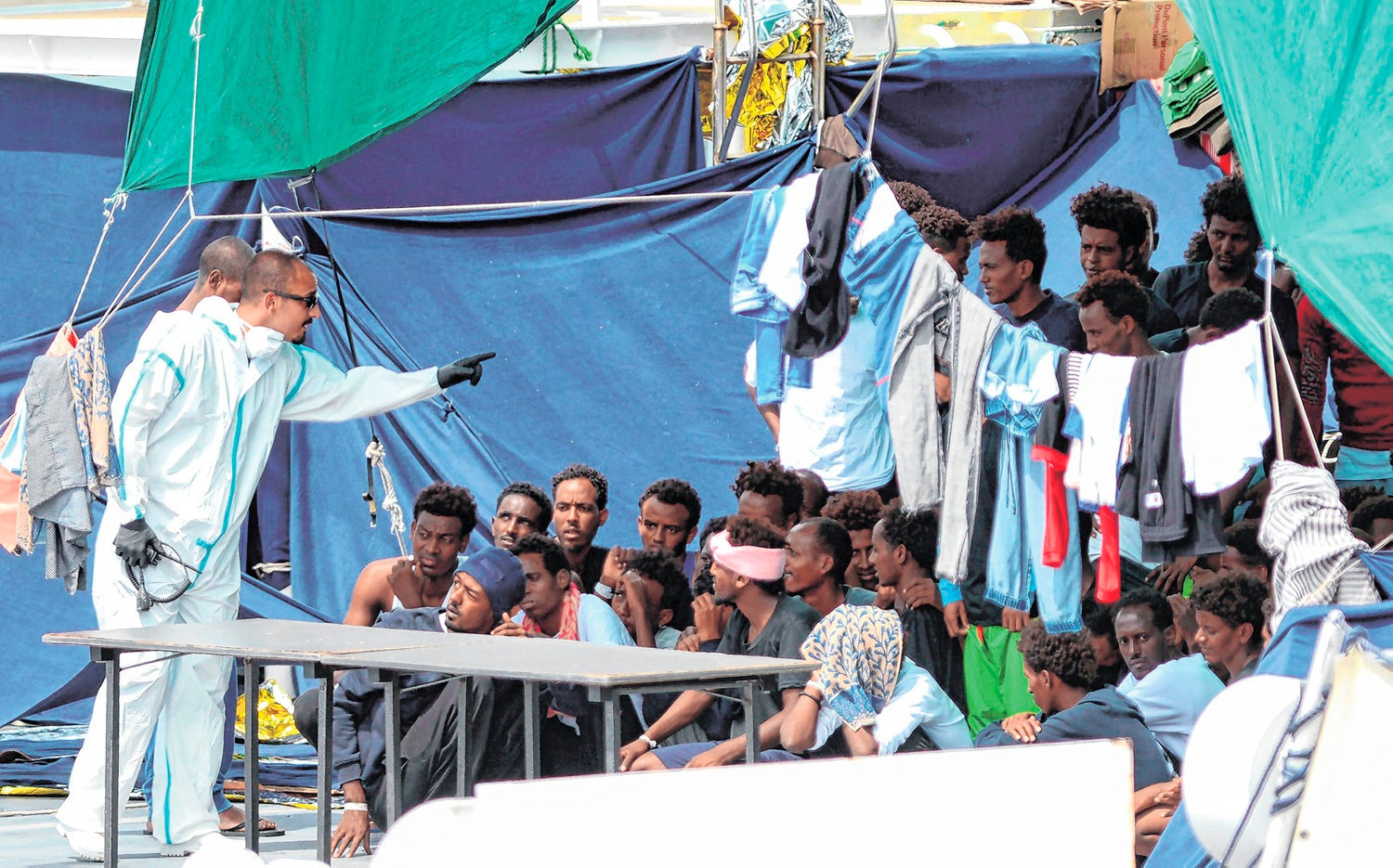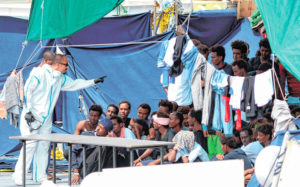

This week brought yet another story of politicised European anxieties about migration converging in the fate of one ship – or rather that of its passengers. The ship is called the Diciotti and it is part of the Italian coastguard fleet. On board are 177 migrants, most of them from Eritrea and Somalia, who were rescued by two Italian patrol boats as they tried to cross from Libya to Europe by sea.
They were then transferred to the Diciotti. But the Italian authorities denied its own coastguard’s vessel the right to disembark at any port. Malta also refused access.
For five days the Diciotti remained at sea with nowhere to go. Italy’s firebrand Interior Minister Matteo Salvini – leader of the far-right Lega party within the governing coalition government – threatened to return the migrants to Libya unless other European governments offered to take some of them in.
Salvini’s threats are against international law as Libya has been declared unsafe. Thousands of migrants languish in detentions centres there. Abuses in these centres are rife, as human rights organisations have documented.
But Salvini, who is considered the driving force in an oddball coalition that sees his far-right party in alliance with anti-establishment neophytes, the Five Star movement, campaigned on a crudely anti-immigrant platform and he clearly believes the migration question is one that rallies his base.
The Diciotti was eventually granted permission to land in Catania, Sicily, on Tuesday but Salvini is still refusing to allow the passengers (apart from some 27 unaccompanied minors) to disembark until other EU member states have agreed to take them in. Yesterday, Italy’s Deputy Prime Minister Luigi Di Maio said his party – the Five Star movement – would vote to suspend funding to the European Union next year unless other states agreed to welcome the stranded migrants on the Diciotti.
It is just the latest such incident this summer, a time of year when better weather and sea conditions usually lead to a rise in the numbers attempting to make the crossing from Libya – where human smugglers have flourished in a political and security vacuum – to Europe.
Italy has long been the main destination, though the numbers taking the route from Morocco to Spain is increasing: so far in 2018, more than 30,000 migrants have arrived in Spain by sea.
But the toxic blend of far-right and anti-establishment populism currently ruling Italy makes the issue a lightning rod there, even if the numbers of migrants landing in the country this year is the lowest it has been for years.
Though Salvini’s party is the junior partner in the coalition government, he dominates the political scene and his incendiary rhetoric is a fixture in Italian media. He recently quoted a notorious Mussolini line – “more enemies, more honour” – on the former dictator’s birthday.
He has claimed immigrants are undermining security and national identity. His call for a census of non-Italian Roma appalled many.
But ratings for Salvini and his party have only risen and so he clings to the anti-immigrant messaging that apparently continues to win Lega more supporters. Critics say it is also a convenient distraction from other issues, including the economic crisis, unemployment and crumbling national infrastructure as the recent collapse of a key bridge in the port city of Genoa illustrated.
And so this has been a summer of Salvini stand-offs over migrants rescued at sea. In June, the Aquarius, a rescue boat operated by French NGO SOS Méditerranée, was refused permission by Italian authorities to dock in any of the southern Italian ports where migrants had been disembarked in the past.
With Salvini and his coalition partners having just been sworn in a few days earlier, this was clearly a bid to flex muscles.
Salvini created a social media hashtag #chiudiamoiporti (“let’s shut down the ports”) and fumed on Facebook that “the rest of Europe had been minding its own business” on the question of migration for too long.
Malta also refused docking rights to the Aquarius, which eventually sailed to Spain after it agreed to take in the migrants. And on August 13, the Italian government again refused the Aquarius permission to disembark another 140 passengers, this time suggesting either Malta or the UK should take responsibility instead. A compromise was eventually found in which the Aquarius docked in Valletta and a number of EU member states agreed to share distribution of the migrants.
Humanitarian agencies have called for the migrants on the Diciotti to be allowed to disembark, noting their vulnerabilities after transiting through Libya. For now they remain not only stuck on the Italian ship but also caught up in what is becoming an all too familiar European stand-off.
And their plight is not likely to be the last such story.
Irish Independent





































